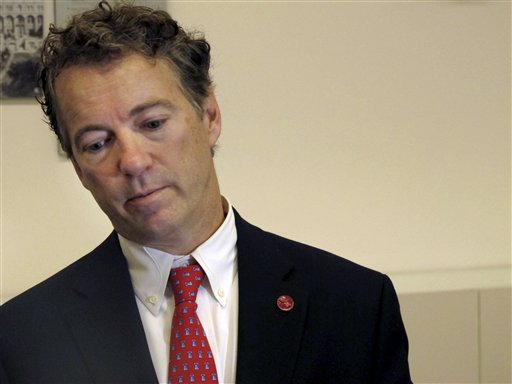Kentucky senator Rand Paul, a likely 2016 presidential candidate, delivered a speech yesterday at the Heritage Foundation arguing that "a more restrained foreign policy is the true conservative foreign policy." Alana Goodman covered the story for us here. I like Rand Paul, having spent some time with him for a 2011 Weekly Standard cover story, and am interested in his attempts to bring his father's philosophy of sound money, less spending, and noninterventionism into the mainstream of the GOP. But I also found his speech yesterday more than a little confusing.
For instance: Paul spent a lot of time trying to distinguish the foreign policy of Ronald Reagan from the foreign policy of "the war party" or "neoconservatives" and their endless Neo-imperial McCarthyite wars. "Reagan’s foreign policy was much closer to what I am advocating than what we have today," Paul said. After all, none other than David Keene has "noted that Reagan’s policy was much less interventionist than the presidents of both parties who came right before him and after him."
I'm not sure how one could describe Reagan, who bombed Libya, deployed MX missiles to Europe, spent lavishly on defense, toppled the government of Grenada, and attacked Iranian naval assets, as "much less interventionist" than Carter. And I'm especially not sure how one could make such a claim after saying the following:
In the 1980’s the war caucus in Congress armed bin Laden and the mujahideen in their fight with the Soviet Union. In fact, it was the official position of the State Department to support radical jihad against the Soviets. We all know how well that worked out.
About that "war caucus in Congress" in the 1980s: From what I have read it was not all that large, considering the Democrats controlled the House throughout the decade and the Senate from 1987 on. To the extent that congressmen supported a policy of arming and financing anti-Communist insurgencies around the globe, however, they seem to have been following the "official position of the State Department" as defined by cabinet secretaries appointed by ... Ronald Reagan. Who was cheerfully identified with what one writer at the time called the "Reagan Doctrine" of "overt and unashamed American support for anti-Communist revolution." Which involved pitched legislative and administrative battles over funding to groups such as the anti-Soviet holy warriors in Afghanistan and the anti-Sandinista contras in Nicaragua. And which did not involve as much "strategic ambiguity" as Paul seems to remember. There isn't a whole lot strategic ambiguity, for example, in calling the Soviet Union an "evil empire" and consigning it to the "ash heap of history."
Needless to say, Ronald Reagan did not proclaim a policy of anticipatory self-defense, or of regime change by land invasion, or of seeking and supporting "the growth of democratic movements and institutions in every nation and culture, with the ultimate goal of ending tyranny in our world." I suppose by these standards you could say Reagan was "much less interventionist" than George W. Bush. But that would be making a dates-to-figs comparison. Ronald Reagan confronted different problems in a different time. The Soviet Union still existed when he left office, the Taliban had not yet come to power in Afghanistan, and America had not yet experienced the worst terrorist attack in its history. Who's to say what Reagan would have done had he been president on September 11, 2001?
I am open to the idea of fresh foreign policy thinking in the GOP. I don't see a compelling national interest in Syria, for instance. And I have no idea what we'll end up doing about Iran. Republicans and conservatives would benefit from debates over intervention and diplomacy. What they won't benefit from is facile and misleading historical analogies.
